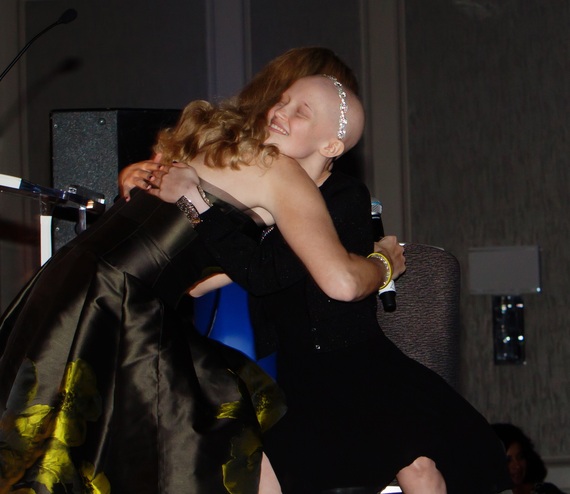
As a victim of a poor memory, I remember only flashes of our first weeks in the hospital. Visits, conversations, tears, rooms, tests, scans - they all run together in my cloudy mind. There is, however, one event I recall with perfect clarity.
He texted to ask if it was okay if he stopped in on his way home from work. I wasn't sure we needed a visitor, but Kylie agreed. Freshly diagnosed with Ewing's Sarcoma, we were in the pediatric cancer wing where Kylie had begun her first round of chemo. By the time he arrived, our patient was sleeping and I got up to greet him quietly. I remember he put his backpack against the wall and opened his arms to hug me.
- I am not a hugger...
- This is weird...
- He's here for Kylie, not me...
- Do I hafta?
- I'm okay, I don't need this...
Not a word was spoken and I promptly fell apart in his embrace. I cried like I had never cried in my life. He just held on for the ride.
What my friend Steve gave me that day was the very essence of what to say when there is nothing to say:
Love
Love is all there is. Love can speak volumes without an audible syllable. It can be felt in a quiet room where words aren't welcome. It might be simplistic, but love is all that can break through the hard shell of pain and fear caused by a dreadful diagnosis or another traumatic bomb that explodes in your midst.
"Love can speak volumes without an audible syllable."
In the wake of the tragedy, there are no magic words that instantly sooth. But here are some things that resonated with me when Kylie was first diagnosed:
1. An expression of regret - "This really sucks" (or "stinks" for the less crass. But I assure you, it does suck!)
2. A profession of love and friendship. How do you say that? Um... "I love you." For those uncomfortable with the ever-personal "I", you can always lean on the family crutch for support and say, "We love you guys."
3. Presence. "I'm here." There are few positives in having a child with cancer, but one is that your calls rarely go to voicemail. Availability can be sensed. I knew very little in those traumatic first weeks, but I knew who was there for me, and I called on them when needed.
4. A promise of endurance. There is most likely a long road ahead for the family of the diagnosed. Like anything, many friends with good intentions begin the fight full of fervor but life gets in the way. No judgments here, I get that. A promise such as, "I am here today, tomorrow, and in six months," means a lot when given sincerely.
5. A specific help or offer of assistance. Sometimes, this isn't even verbal. If you see a need, meet it.
- We once came home to find a huge painted pot full of yellow flowers on our porch.
6. An assurance of prayer and/or positive thoughts. To know that my little girl was on the forefront of people's minds was huge. Knowing that children included Kylie in their nightly bedtime prayers was humbling - especially when my prayers couldn't get past a groan and balled fist.
"Love molds unique talents into lavish gifts.."
Nobody knows what to say to a parent in the wake of a life-threatening diagnosis or the death of their child. We didn't know what we wanted to hear - it was uncharted territory we'd rather not have explored. I assure you we were glad to not be travelling alone. If you have friends who find themselves on this or another heartbreaking voyage, I would urge you not to be afraid to approach them. Just step out in love, the right words will come.
You might start with a silent hug. Even the bristliest of us could use a hug from time to time.
This post is part of Common Grief, a Healthy Living editorial initiative. Grief is an inevitable part of life, but that doesn't make navigating it any easier. The deep sorrow that accompanies the death of a loved one, the end of a marriage or even moving far away from home, is real. But while grief is universal, we all grieve differently. So we started Common Grief to help learn from each other. Let's talk about living with loss. If you have a story you'd like to share, email us at strongertogether@huffingtonpost.com.
